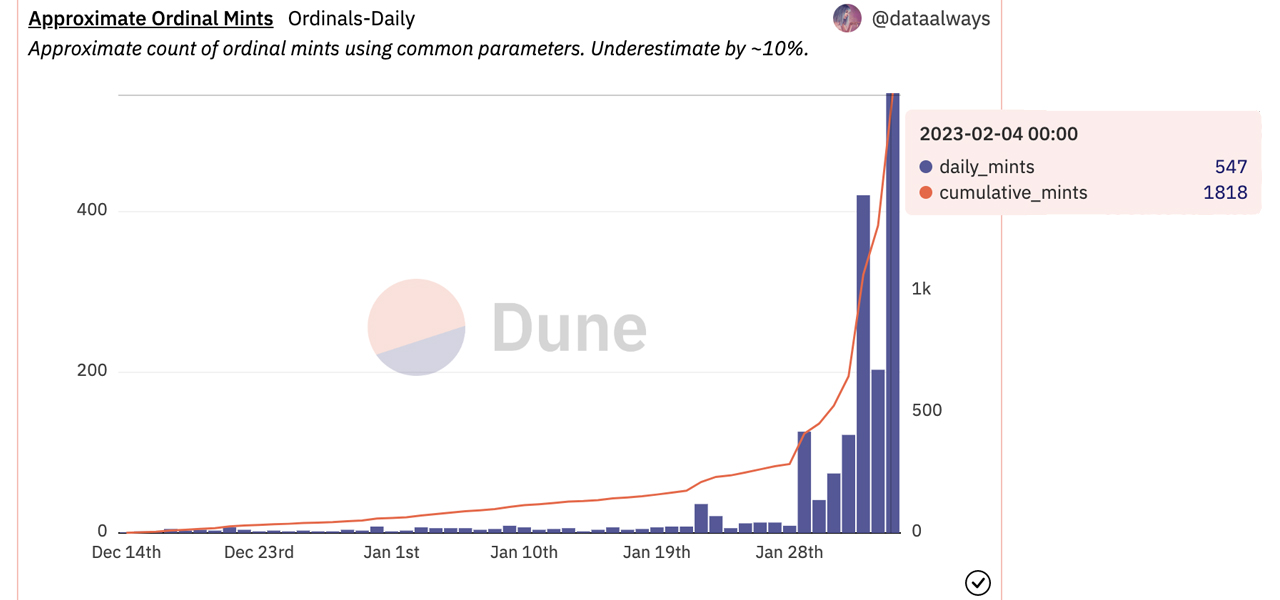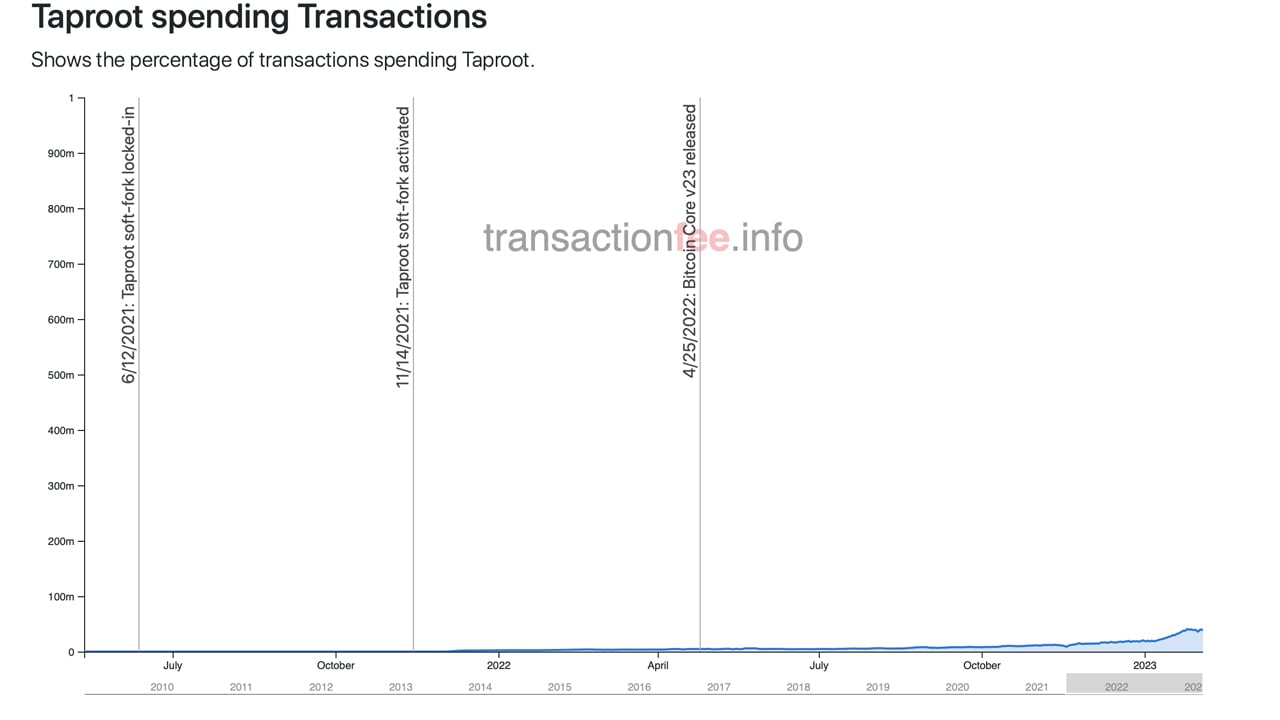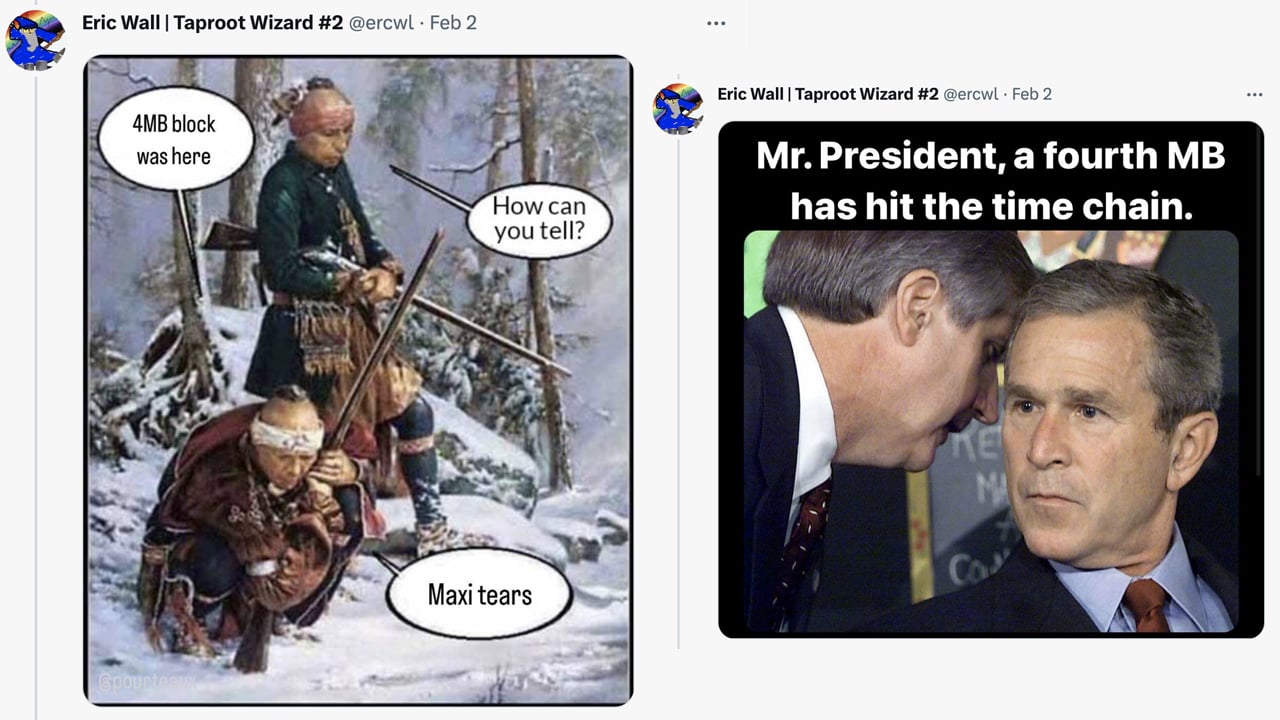
During the past two weeks, members of the cryptocurrency community have discussed the non-fungible token (NFT) concept known as Ordinals. Since the 3.96 MB block (#774,628) was mined, there has been a significant increase in Ordinal inscriptions on the Bitcoin blockchain.
Ordinal Inscriptions on Bitcoin Blockchain Spark Debate Among Crypto Community
The controversial NFT concept known as Ordinals, which uses the Bitcoin blockchain to mint inscriptions, has been a highly topical subject recently. Since its introduction, there has been a marked increase in the number of inscriptions being added to the Bitcoin blockchain in a permissionless manner. This includes JPEG images, NFTs from other blockchains like Bored Apes, and even a DOOM video game file. The biggest surprise was when the Luxor mining pool mined a 3.96 MB block (#774,628) that contained Ordinal inscription #652, a JPEG image of a wizard.

Since that block was mined, the number of Ordinals minted has increased further and the mint rate has grown significantly since the project’s inception. According to statistics from Dune Analytics, until Jan. 20, 2023, there were fewer than 10 Ordinals minted daily. By Jan. 22, the number rose to 36. On Jan. 29, 2023, there were over 100 mints, and the next two days saw numbers just under 75. After the Luxor block with inscription #652 was produced, the number of mints surged to 420 on Feb. 2, 2023, and the next day saw 203 Ordinal inscriptions.

There have also been a number of large blocks, not quite reaching 4 MB, but close to the 3 MB range. For example, block heights #774,997 and #774,996 were near the 3 MB range, larger than the previous record, before Luxor’s block, of 2.765 MB (#748,918) mined on Aug. 11, 2022. Despite the fact that Feb. 4, 2023, is not over, 547 Ordinal inscriptions have already been added to the Bitcoin blockchain on Saturday, making it the highest daily number of Ordinal mints to date. Currently, the proportion of block space used by Ordinal inscriptions is not substantial, but it is growing daily.

Bitcoin maximalists and proponents of small blocks are expressing concern about the Ordinal inscriptions and sharing their opinions on the matter. Bitcoin advocate Jimmy Song has claimed that the Luxor mining pool will be “punished by the market” and suggested that smaller blocks may be necessary. “Unpopular opinion,” Song tweeted, “If inscriptions start bloating the chain, a decreased block size must be considered.” The issue has drawn criticism from Bitcoin developer Luke Dashjr, who has frequently stated that Ordinal inscriptions are similar to “attacking Bitcoin.”

Blockstream’s Adam Back has also commented on the situation, expressing his opinion. “You can’t stop them, of course,” Back said. “Bitcoin is designed to be censor-resistant. That doesn’t prevent us from mildly commenting on the sheer waste and stupidity of an encoding. At least do something efficient. Otherwise, it’s just another proof-of-consumption of block-space thing.” Others have referred to Ordinals as a “spam attack,” and some have called on developers to address the issue with a soft fork. “Ordinals are an attack on Bitcoin,” Derek Ross tweeted. “It’s being orchestrated by known bad actors,” he added.
Many others disagree with calling Ordinal inscriptions an attack. Crypto advocate Udi Wertheimer tweeted: “Bitcoin maximalists aren’t real bitcoiners. Real bitcoiners are a happy bunch that likes to have fun. Hal Finney, for example, would have loved the [Taproot Wizards] Bitcoin NFTs. Let’s make bitcoin fun again.” Wertheimer shared an old Hal Finney email sent to the Cypherpunks mailing list discussing “cryptographic trading cards.” Digital currency supporter Eric Wall emphasized this week that no Bitcoin maximalist celebrated the increase in Taproot adoption.
“After 14 months of sub-3% Taproot adoption we suddenly reached 99.5% Taproot adoption this week and not a single Bitcoin maximalist celebrated,” Wall said. “I don’t understand you guys. What do you want?” Wall added.
What are your thoughts on the recent surge of Ordinal inscriptions on the Bitcoin blockchain? Are they a positive or negative development for the future of the Bitcoin network? Share your thoughts in the comments section below.
Image Credits: Shutterstock, Pixabay, Wiki Commons
Disclaimer: This article is for informational purposes only. It is not a direct offer or solicitation of an offer to buy or sell, or a recommendation or endorsement of any products, services, or companies. Bitcoin.com does not provide investment, tax, legal, or accounting advice. Neither the company nor the author is responsible, directly or indirectly, for any damage or loss caused or alleged to be caused by or in connection with the use of or reliance on any content, goods or services mentioned in this article.










